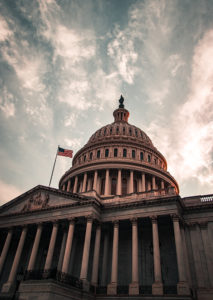Reason, Truth, and Breakfast with the Congressional Freethought Caucus
 Photo by Kyle Mills on Unsplash
Photo by Kyle Mills on Unsplash Last Friday, the Congressional Freethought Caucus held its inaugural Thomas Paine Breakfast where climate scientist Dr. Michael Mann and political theorist Dr. Danielle Allen joined members of Congress for a compelling discussion about how science, reason, and ethics can support secular democracy. The breakfast was hosted by caucus co-chairs Representative Jared Huffman (CA-2) and Representative Jamie Raskin (MD-8), who were joined virtually by members of Congress along with representatives of nontheist and secular organizations.
The Congressional Freethought Caucus, founded in 2018, promotes public policy formed on the basis of reason, science, and moral values; protects the secular character of our government by adhering to the strict Constitutional principle of the separation of church and state; opposes discrimination against atheists, agnostics, humanists, seekers, and nonreligious persons; champions the value of freedom of thought and conscience worldwide; and provides a forum for members of Congress to discuss their moral frameworks, ethical values, and personal religious journeys.
Dr. Mann is Distinguished Professor of Atmospheric Science at Penn State, with joint appointments in the Department of Geosciences and the Earth and Environmental Systems Institute. His honors and awards include the National Oceanic and Atmospheric Administration’s (NOAA) outstanding publication award in 2002 and selection by Scientific American as one of the fifty leading visionaries in science and technology, also in 2002. Additionally, he contributed, with other authors from the Intergovermental Panel on Climate Change (IPCC), to the award of the 2007 Nobel Peace Prize. His most recent book, The New Climate War: The Fight to Take Back Our Planet, published in 2021, shows how fossil fuel companies have waged a thirty-year campaign to deflect blame and responsibility and delay action on climate change, and offers a plan to save the planet.
Dr. Allen, the James Bryant Conant University Professor at Harvard University and Director of Harvard’s Edmond J. Safra Center for Ethics, has published broadly in democratic theory, political sociology, and the history of political thought. Widely known for her work on justice and citizenship in modern America and ancient Athens, Allen’s recent publications include Our Declaration: A Reading of the Declaration of Independence in Defense of Equality (2014), Education and Equality (2016), and Cuz: The Life and Times of Michael A. (2017). She is the co-editor of the award-winning Education, Justice, and Democracy and From Voice to Influence: Understanding Citizenship in the Digital Age. Allen is also the principal investigator for the Democratic Knowledge Project, a distributed research and action lab at Harvard University.
Both guest speakers kicked off the event with short, ten minute lectures on their respective research. Dr. Mann provided a brief overview of the dangers of our climate crisis if left unaddressed by Congress and he specifically honed in on how certain media companies have distorted the reality of climate change and how governments have held those companies accountable. Dr. Allen shared findings from her recent work on civic engagement on social media, and provided a roadmap to how we can re-center truth in our civic conversations about climate and more. She pointed members of Congress to a recent panel discussion she moderated on the role of information in democratic society and two reports: one on the role of libraries in the mis/disinformation age and another that provides a roadmap for strengthening our commitment to civic ethics.
Although there was some doom and gloom about the persistence of disinformation campaigns in the media or our latest climate cliff projections (it’s getting more terrifying by the day), the conversation also included positive outlooks. Dr. Mann reminded participants that while we are certainly late to react to the climate crisis, late is better than never. And Dr. Allen underscored that relationship building between elected officials and those they represent via small group discussions and meetings has proven effective in repairing trust and accountability.
Essentially, the conversation boiled down to two questions: How do we compel people in power to be truthful? And how do we reestablish truth and facts as prerequisites of public service? One answer is that we must all do the intentional work of creating environments where truth is expected and uphold standards for those who participate in those spaces. Doing that requires rebuilding relationships and trust among those who disagree. As Dr. Allen pointed out, you have to trust someone to reason alongside them. That’s not an easy lift, but it is a good place to start.
The American Humanist Association was proud to help the caucus organize the event and is looking forward to continuing the conversation.
